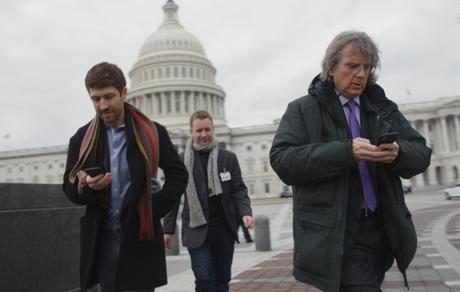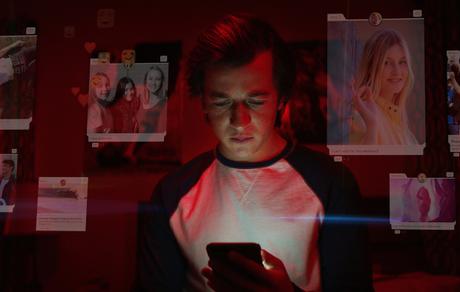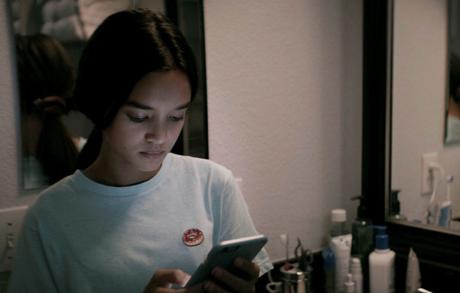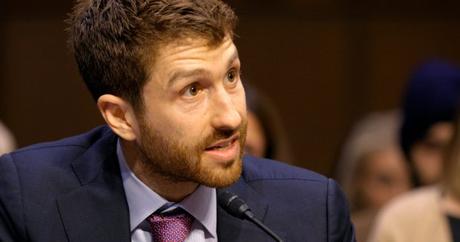 Documentary Content: Director Jeff Orlowski's film explores the rise and impact of social media in society. Told from the perspective of some of its main architects including Tristan Harris, Justin Rosenstein, and Tim Kendall, The Social Dilemma demonstrates how social media has increased polarization, financial exploitation, and addiction. The film also intersperses interviews with a dramatization of one teen's social media distractions.
Documentary Content: Director Jeff Orlowski's film explores the rise and impact of social media in society. Told from the perspective of some of its main architects including Tristan Harris, Justin Rosenstein, and Tim Kendall, The Social Dilemma demonstrates how social media has increased polarization, financial exploitation, and addiction. The film also intersperses interviews with a dramatization of one teen's social media distractions. Review: With the caveat that the release of 2020 films have been few and far between, The Social Dilemma without question is the best movie I've seen this year. Compelling, well researched, thought provoking, and in many ways terrifying, this documentary is a must for, well, pretty much everyone.
Much like his previous documentaries Chasing Ice and Chasing Coral, Orlowski turns an objective eye on the ubiquitous nature of social media. Interestingly enough, all three documentaries deal with the negative consequences of human beings' interaction with the environment. However, whereas the former two focus on the physical environment, The Social Dilemma highlights the interpersonal and mental impacts of social media on people.
As you might expect, the impact to a large degree, is negative. The statistics are shocking, whether it's the vast increase in mental health and suicide rates over the past decade (especially among girls) or the prevalence of surveillance capitalism. This negative approach highlights one of the few downsides of The Social Dilemma in that little to no time is spent on the positive side of social media. There's a little too much doom and gloom with some interviewees stating civil war could be the end result. However, even this is understandable considering the point of The Social Dilemma is meant to be a sobering wake-up call, rather than a saccharine "feel good" piece. Great documentaries ultimately make the viewer think critically and re-examine their stance on certain topics, something The Social Dilemma does remarkably well.
What The Social Dilemma proves pretty conclusively is that social media does the complete opposite of my last sentence. Rather than force you to think critically, it has a vested interest in stoking your emotions and nudging you in a certain direction. In fact thanks to data mining, social media algorithms have become quite astute at steering people onto certain paths. Your feed becomes cultured to keep you in your own political, religious, and ideological bubble. As a consequence, society has seen a rise in polarization - particularly across the political divide - virtually unprecedented in the history of humankind. And why? Put simply: money. Surveillance capitalism (the commodification of your personal data so that advertisers can better target you) is legion and the bigwigs in Silicon Valley have reaped the rewards.

Just as alarming has been social media's contribution to a rise in conspiracy theories across the internet. Thirty years ago I would never have thought that in the second decade of the 21st century, anti-vaxxers would be a thing or that the Flat Earth Society would still exist. Instead I get bombarded with ridiculous YouTube videos from my Dad like Out of the Shadows that claim Hollywood is run by a secret cabal of devil worshiping pedophiles involved in a vast child human trafficking ring. Or that Pizzagate (which has been debunked by everyone) was real. (Proceeds to pull out hair like Fletcher Reed in Liar, Liar).
Over twenty-five years ago when I wrote my first term paper in the seventh grade, my teacher drilled into us the fundamental nature of primary sources. In other words the best, most authentic papers that hold up to scrutiny flow from primary (first hand) sources. That fact alone makes The Social Dilemma a notable and important work because the film is rife with first hand sources. The interviews conducted involve people who actually worked at these companies whether it's Tim Kendall who worked for both Pinterest and Facebook, Facebook "like" button creator Justin Rosenstein, virtual reality pioneer Jaron Lanier, and a host of others.
However, the most compelling interviewee and the face of the film is Tristan Harris, a former Google employee who created the Center for Humane Technology and has testified before Congress multiple times. An eye-opening sequence - brilliantly recreated through animation - depicts the time Harris created a mission statement video outlining how Google should foster an ethically sound business model that protects its customers. The video when viral within the company, reaching as far the CEO of Google. Think Tom Cruise in Jerry Maguire just not as dramatic. Sadly the result was exactly the same as Cameron Crowe's film - nada. Reason being that companies like Google have a vested interest in maintaining the status quo.

With all of these indictments of social media by various members of Silicon Valley, you'd think that most of them wish there was a magic James Halliday-esque button that would wipe out he whole mess altogether. However, that's not really the case. In fact arguably social media's biggest critic, Jaron Lanier, states unequivocally that he doesn't desire these companies destruction, he just wants more accountability and oversight. In a realm where both of these things are non-existent, it's hard to argue against his conclusions.
If The Social Dilemma possesses one drawback, it lies in the dramatization depicted in the film. Through the dramatization, Orlowski's tries to underscore the hard interviews with a potential real-life scenario. While I understand the sentiment, it proves completely unnecessary. The material itself is compelling and interesting enough on its own. Orlowski would have been better off either severely reducing the dramatization or excising it altogether.
As I stated at the beginning of this review, the best documentaries (and films in general) make you think critically and sometimes change your mind. The Social Media made me change my mind. Before, I used to think that smart devices like cell phones and social media were tools just like anything else. It wasn't about the tool it was about the user. A person can take a knife and use it to cook a gourmet meal or murder someone in cold blood. I don't feel that way anymore about social media and smart devices. Social media and smart devices are not tools. Regular tools don't demand your time, foster addiction, nudge you towards directions and ideas you never would have believed in otherwise. Without proper oversight, social media will remain dangerous and in some instances deadly.
Much like the environment, the future of social media lies in our hands and it's up to us as to whether or not we create Heaven or Hell on Earth.
My rating System:

